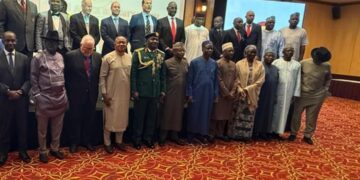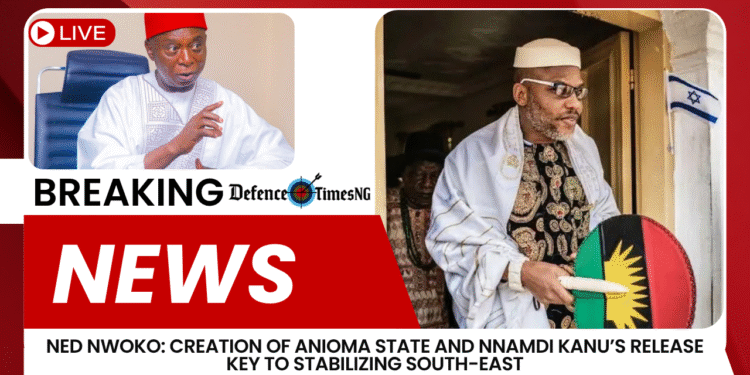Senator Ned Nwoko has called for pragmatic steps to de-escalate tensions in Nigeria’s South-East, emphasizing that true peace and stability can only be achieved through political inclusion and judicial reconciliation.
Appearing on Channels Television’s Sunday Politics, the Delta North senator argued that the creation of one additional state in the South-East and the release of Indigenous People of Biafra (IPOB) leader, Nnamdi Kanu, would significantly ease long-standing grievances fueling unrest in the region.
“When these two issues are addressed — the creation of Anioma State and Kanu’s release — peace will return to the South-East,” Nwoko asserted.
Strategic Implications for National Security
Nwoko’s position underscores a broader reality long acknowledged by defence analysts: security in the South-East cannot be sustained solely through kinetic operations. Instead, sustainable peace requires addressing political and structural inequities that have fed separatist sentiment and distrust of federal authority.
Since Kanu’s re-arrest in 2021, security agencies have battled recurring flashpoints of violence, including sit-at-home enforcements, targeted attacks, and disruption of civic life. Nwoko argued that the IPOB leader’s continued detention now serves as a symbol of injustice, inadvertently strengthening extremist narratives and undermining reconciliation efforts.
By contrast, his release — managed within a national dialogue framework — could open diplomatic channels between the state and alienated youth groups, reducing the recruitment base for militancy and restoring public confidence in the justice system.
Anioma State: Political Inclusion as a Peace Strategy
Nwoko also renewed his advocacy for the creation of Anioma State, carved from the existing Delta State to become the sixth state in the South-East geopolitical zone.
He noted that the imbalance in Nigeria’s state structure — where the South-East remains the only region with five states — continues to feed perceptions of marginalization.
According to Nwoko, the Senate Committee on Constitution Review has already adopted the proposal to add a new state to the South-East, a step he described as “long overdue for equity and national cohesion.”
“The creation of Anioma State would be a landmark gesture of inclusion and a catalyst for peace. It would also be a historic move by President Bola Tinubu’s administration,” he said.
Defence Outlook: From Containment to Stability
For security planners, Nwoko’s recommendations highlight the strategic linkage between governance and peace enforcement. Analysts argue that the Nigerian military’s ongoing stabilization efforts in the South-East — led by joint operations under Defence Headquarters — would benefit from complementary political interventions that remove the roots of grievance.
Creating an additional state would strengthen administrative presence, expand intelligence coordination, and enhance federal outreach to communities long distant from governance structures. Simultaneously, the conditional release of Nnamdi Kanu could help reframe engagement with the region’s youth population — shifting the narrative from confrontation to reintegration.
Building a Framework for Lasting Peace
While both proposals require constitutional, legal, and political consensus, their potential impact extends beyond the South-East.
They align with Nigeria’s broader whole-of-government approach to national security, which recognizes that political equity, justice, and development remain integral components of peacebuilding.
In essence, Nwoko’s intervention challenges policymakers to see peace not merely as a product of military containment, but as an outcome of structural inclusion.
For the South-East — and for Nigeria at large — that balance between justice and security may be the most decisive test of national unity yet.
📰 Originally reported by DefenceTimesNG.africa
#NationalSecurity #Nigeria #SouthEastPeace #NedNwoko #NnamdiKanu #AniomaState #GoodGovernance #SecurityStrategy







